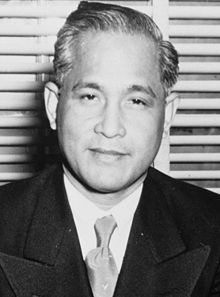Carlos P. Garcia
Carlos Polestico Garcia (born November 4, 1896 in Talibon , † June 14, 1971 in Quezon City ) was a Filipino politician and the eighth President of the Philippines .
Studies and political career
The son of a mayor studied law at Silliman University in Dumaguete and the Philippine Law School. In 1923 he earned a Bachelor of Laws (LL.B.) degree .
Garcia began his political career in 1925 as a member of the House of Representatives . There he represented the Third District of Bohol . He was later from 1931 and 1941 governor of his home province Bohol on the Visayas archipelago .
In 1941 he was elected senator. He then represented the interests of the "Nacionalista Party" in the Senate of the Philippines until 1953 . During the Second World War Garcia was active in the resistance movement . In the 1st Congress of the Philippines from 1946 to 1953 he was also chairman of the minority in the Senate.
Vice President and Foreign Minister
In 1953 he was elected Vice President of the Philippines as a candidate of the "Nacionalista Party".
At the same time, the then President Ramon Magsaysay appointed him Foreign Minister from 1953 to 1957. As such, he headed the Manila Conference in 1954 at which the founding of the Southeast Asia Treaty Organization (SEATO) was decided. In the following years he then headed the Philippine delegations at the SEATO meetings in Bangkok , Karachi and Canberra .
President of the Republic of the Philippines from 1957 to 1961
After the death of President Magsaysay in a plane crash on March 17, 1957, Garcia was initially acting President as Vice President. At the end of the same year he was elected President for a four-year term.
During his presidency from December 30, 1957 to December 30, 1961, on the one hand, he strengthened the traditionally strong ties between the Philippines and the United States and, on the other, sought closer ties with other non-communist countries in Asia . Domestically, he was particularly famous for his "Filipino first" policy. This "Filipino First" policy sought to transfer control of the country's economy from foreign to Filipino hands. In addition, the “Bohlen-Serrano Agreement” was concluded during his tenure, which meant that the guarantee for the US military bases was shortened from 99 to 25 years (with a renewal option for five years at a time).
In November 1961, however, he was defeated by his Liberal Party challenger and incumbent Vice President Diosdado Macapagal . After this defeat, he withdrew from active politics.
Political activity in the Marcos era

On June 11, 1971, then President Ferdinand Marcos appointed him President of a commission to draft a new constitution . Before Garcia could take office, he passed away three days later.
Garcia also wrote poems like Batan-Ong Pilipinhon (Filipino Youth) and was nicknamed "Prince of the Visayas Poets" for it. In his honor a parish was established on Bohol Pres. Carlos P. Garcia called.
See also
literature
- Carlos P. Garcia , in: Internationales Biographisches Archiv 28/1971 of July 5, 1971, in the Munzinger Archive ( beginning of article freely available)
Web links
- Biography in rulers.org
- Biography with extensive background information in geocities.com ( Memento from October 11, 2007 in the Internet Archive )
- Biography in globalpinoy.com
| personal data | |
|---|---|
| SURNAME | Garcia, Carlos P. |
| ALTERNATIVE NAMES | Garcia, Carlos Polestico |
| BRIEF DESCRIPTION | Filipino politician and president |
| DATE OF BIRTH | November 4, 1896 |
| PLACE OF BIRTH | Talibon |
| DATE OF DEATH | June 14, 1971 |
| Place of death | Quezon City |
